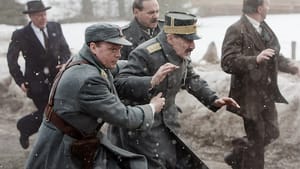Stay in the Loop
BSR publishes on a weekly schedule, with an email newsletter every Wednesday and Thursday morning. There’s no paywall, and subscribing is always free.
Heavy is the head
Erik Poppe's 'The King's Choice'

Most major war movies, particularly those set in World War II, usually focus on the big players — the United States, Great Britain, and Germany — or at least have perspectives centered in those contexts. That is understandable, especially if the filmmaker wishes to tell an epic story (for example, Christopher Nolan’s acclaimed Dunkirk). However, sometimes a smaller war movie, such as The King’s Choice from Norway, wants to tell a more intimate story from a different perspective.
Directed by Erik Poppe, the movie highlights the not-very-familiar (at least in the US) history of the Nazi occupation of Norway at the beginning of World War II. The story focuses on the Norwegian royal family, headed by King Haakon VII (played by Jesper Christensen), and the dilemma faced by him as Nazi Germany essentially steals his country out from under him.
While Norway existed in some form or other for centuries, the modern independent state is a relatively recent creation, having been formed in 1905 by its peaceful separation from Sweden. That same year, the Norwegian Parliament unanimously elected Prince Carl of Denmark to be king, and he took the formal name Haakon VII. Haakon was still on the throne in 1940, when the events portrayed in The King’s Choice transpired.
At this point, the Norwegian kingship was largely a ceremonial position, with severely limited constitutional powers. The invading Germans, however, put Haakon in the position of making decisions that would determine the fate of his country and people.
Three days in April
The movie follows the events of three days in April 1940, the time it took Germany to move in and take control of the wholly unprepared Norway, which up to that point had maintained strict neutrality. Knowing they would be overwhelmed, the members of the Norwegian cabinet, a legislative body with actual political authority, wanted to negotiate with the Germans to prevent a massive loss of life.
Hitler insisted that his people were allowed to negotiate only with the king. Haakon, faced with the prospect of assuming power he did not have, was faced with either surrendering his country to the Nazis or following the law of his land and insisting that the Germans negotiate with the cabinet. The risk was that the Nazis would consider this defiance and then do what Nazis did best: slaughter people.
It’s hard to tell any story about World War II without getting caught up in the epic nature of the events, but director Poppe struggles to tell a more intimate story. The script — artfully direct and spare — is focused almost entirely on the king and his immediate family. The few battle sequences are modestly scaled, devised to illustrate what a small player like Norway must go through when it faces the literal big guns and arrogance of a world player like Nazi Germany.
Poppe guides his skilled cast with éclat and subtlety, lending a refreshingly low-key realism to the proceedings but allowing for pyrotechnics when needed. The primary centerpiece, of course, is the king, played with effective gravitas by Christensen. His performance communicates the fear of a man who expected to live a quiet life but found himself caught in the tides of history. Even as he is buffetted by events, Christensen's Haakon strives to rise to the occasion, to be the sort of king that his people need him to be. It’s a bravura performance.
What, When, Where
The King's Choice. Written by Harald Rosenløw-Eeg and Jan Trygve Røyneland, Erik Poppe directed. Opens October 13, 2017. Philadelphia-area showtimes.
Sign up for our newsletter
All of the week's new articles, all in one place. Sign up for the free weekly BSR newsletters, and don't miss a conversation.
 Gary L. Day
Gary L. Day